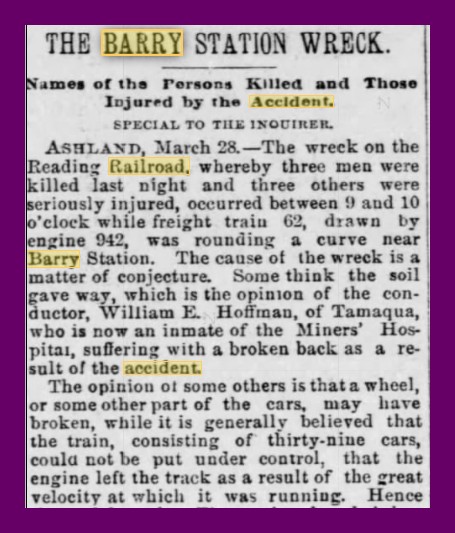A fatal accident occurred on the Philadelphia and Reading Railroad near the railroad station at Barry, Barry Township, Schuylkill County, Pennsylvania, on the evening of March 28, 1891.
From the Philadelphia Inquirer, March 29, 1891:
THE BARRY STATION WRECK
Names of the Persons Killed and Those Injured by the Accident
Special to the Inquirer
ASHLAND, March 28 [1891] — The wreck on the Reading Railroad, whereby three men were killed last night and three others were seriously injured, occurred between 9 and 10 o’clock while freight train No. 62, drawn by engine 942, was rounding a curve near Barry Station. The cause of the wreck is a matter of conjecture. Some think the soil gave way, which is the opinion of the conductor, William E. Hoffman of Tamaqua, who is now an inmate of the Miners’ Hospital, suffering with a broken back as a result of the accident.
The opinion of some others is that a wheel, or some other part of the cars, may have broken, while it is generally believed that the train, consisting of thirty-nine cars, could not be put under control, that the engine left the track as a result of the great velocity at which was running. hence the awful result. The engine lay helpless across the road beneath, with its three victims — Engineer Andrew Walker, of Tamaqua; Fireman John Oaks, of Frackville, and Mr. Myers, of Tamaqua, close by.
The injured are: Jacob Gaylocker, from brakeman, single, and resident of Tamaqua; Lewis Bichart, brakeman, single, resident of Tamaqua; William E. Hoffa, also single, and a resident of Tamaqua. Mr. Meyers, train brakeman on passenger train, who was returning home from Shamokin on the last freight, was not a member of the ill-fated crew. Mr. Meyers, who was riding in the caboose for a distance while the train was being assisted by a pusher, fearing the caboose might be pushed or jammed into the other cars, left it and got on the engine, only to lose his life. This young man lived only a few minutes, during which time he called for his mother.
The farmers for miles around heard the noise occasioned by the piling of heavily loaded cars, and thought it thunder. It was a short time when physicians and willing hands appeared upon the scene to render what assistance they could. Dr. George B. Beach, of Gordon, was one of the physicians who remained until the morning hours. At 5 o’clock Mr. Hoffa was removed to the hospital, where prompt attendance was received. The rest of the dead and wounded were removed by special train to their homes.
Assistant Superintendent Bartoley, with a complete corps of men, soon appeared, each man to his respective work, in order to relay and open up the track. This evening the road is in usual order. The work of removing the engine and debris continued unabated until completed.
____________________________________________________
Story obtained through Newspapers.com.
Corrections and additional information should be added as comments to this post.
